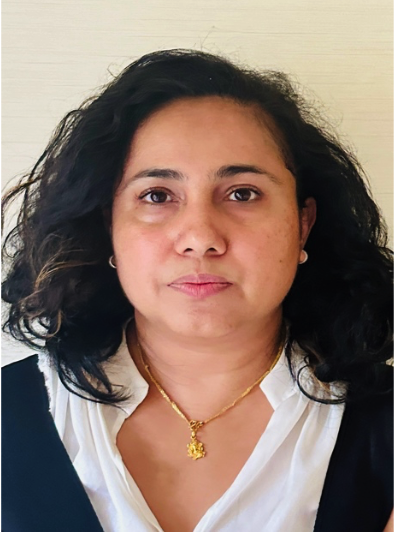36-year-old Sabita Mahat is a single mother. Like any other mother, she wants to make sure her two sons – aged 10 and six – have everything they need. But for Mahat it means having to work extra hard. As a burn survivor, she hasn’t had much luck finding a stable job.
However, Mahat is a skilled henna artist and currently busy in making clay piggy banks and flower vases that seem to have a good demand in the market. In the past two months, she has sold over a 100 pieces. Priced between Rs 250 to 400, Mahat made a pretty decent earning.
“I’m not picky about what I do. Even if I don’t know how to do something and I see there is a chance that it might fetch a solid income, I will teach myself how to do it. I have a family to feed and bills to pay,” says Mahat who has taught herself the basics of stage design and to make various décor items that way.
But there’s a lot of uncertainty that comes with picking up odd jobs and Mahat says it sometimes worries her.
Rumi Rajbhandari, founder of Astitwa, an organization that works to reintegrate burn survivors in the society and equip them with some means of livelihood, has been helping Mahat sell the crafts she makes in the market. Connecting her with potential buyers and approaching prospective clients who might place bulk orders – like banks and corporate houses – on her behalf, Rajbhandari’s goal is to provide Mahat platform for income generation.
“Through Astitwa, I want to help burn survivors rebuild their lives post-recovery. That phase is usually one of the most trying times in their lives,” says Rajbhandari who previously worked as program coordinator for Burn Violence Survivors Nepal.
Returnee women migrants starting their own businesses

In her almost decade long experience of working with burn survivors, Rajbhandari has seen a lot of upheaval in the lives of women who are victims of violence. From coming to terms with the fact that their ‘loved ones’ set them on fire to dealing with excruciating pain even after prolonged treatment, nothing is ever the same.
“It gets worse when they can’t earn a living later on,” says Rajbhandari adding that for a lot of these women, the men were the breadwinners in the family and they were homemakers with no experience in the workforce whatsoever. People are also usually hesitant to employ burn survivors and that makes things even more difficult, she says.
That is exactly what she hopes to be able to change through Astitwa. “By giving them a shot at a decent life, I hope to restore survivor’s lost dignity,” she says.
40-year-old Sabina Pujari too has been looking for work but to no avail. Inspired by Mahat, she has also taken up crafting. She makes colorful thread bangles that she hopes to sell and earn enough to take care of her family. Her 18-year-old daughter, Subina, helps her whenever she can.
The challenge now, says Rajbhandari, is to find a proper market for these crafts. But there’s hope on the horizon because Rise, a non-profit organization working for victims of intimate partner violence and sexual assault/abuse and their families, has recently provided micro loans to Mahat for her piggy bank project.
“It has given a lot of other survivors the hope that they too can find ways of income generation,” says Rajbhandari who plans to set pop-up stalls at different events to sell these crafts again like she has already done a few times in the past.
But that is another challenge, says Mahat. People often say the products she makes or her services are expensive and demand a hefty discount or lower quote. This forces her to work with a meager profit margin. Mahat feels their work is undervalued because they aren’t thought of as professionals. She adds that business deals are hardly ever just that and that there is a ‘charity’ tag attached somewhere.
But everyone who knows Mahat vouches for the fact that she is extremely creative and hardworking. Binisha Maharjan, intern at Astitwa, says Mahat’s enthusiasm for work and zeal to get her life back in track are contagious.
“She has inspired other burn survivors to try to rise above their circumstances by being determined to do so,” says Maharjan. And indeed, Pujari also confesses that she took to bangle making after seeing how Mahat was managing to take care of her family through her artistic inclinations.
Mahat says her life is divided into two parts – one before burn violence and one after – and she’s determined to make the latter better than the former. Right now, her biggest guilt is that she hasn’t been able to let her sons enjoy their childhood, that they have been ‘forced to grow up’ because of her circumstances. Her elder son is a better cook than her.
“My sons are aware of my struggles. Once I had a huge order to complete and I wasn’t feeling well and they helped me finish it,” she says adding that it had made her happy and sad in equal measure. She feels that her children too are being burdened by her problems.
Rajbhandari says Astitwa strives to make ‘a good life’ possible for Mahat and other burn survivors by helping them earn a stable income. This, she believes, is the first step in rehabilitating them in the society and thus reestablishing some normalcy in their lives.
“Burn survivors are done hoping for change and for anyone to come to their rescue. They are going to be the change. They are going to be their own heroes,” she concludes.
cillakhatry@gmail.com








































